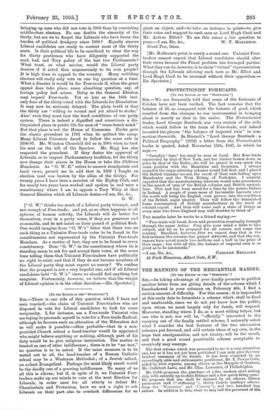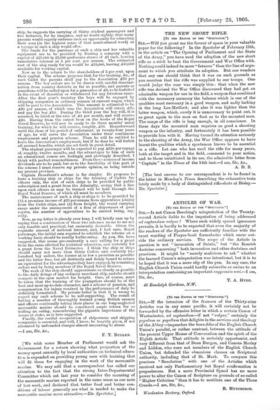THE MANNING OF THE MERCANTILE MARINE. 130 THE EDITOR OP
THE "SPEOTATOR.1 SIR,—In taking advantage of your kindly promise to publish another letter from me giving details of the scheme which I
foreshadowed in your columns on February 4th, I find a certain amount of difficulty. For this reason : it is impossible at this early date to formulate a scheme which shall be fixed and unalterable, since we do not yet know how the public, upon whom we must largely rely for funds, will respond. Moreover, standing where I do, as a most willing helper, but one who is not, nor will be, " officially " interested in the carrying out of the finally settled scheme, I naturally select what I consider the best features of the two alternative schemes put forward, and add certain ideas of my own, in the hope that amalgamation, and not rivalry, will be the result, and that a good sound practicable scheme acceptable to everybody may emerge.
The first scheme which was presented to mo is a very attractive one, but as it has not yet been published I can only give the very briefest summary of its details. It has been compiled by an exceedingly able and enthusiastic gentleman, Mr. E. Powys Cobb, aided by such experts, among others, as the Marquis of Graham, Mr. Cuthbert Laws, and Mr. Chas. Lawrence, of Philadelphia.
Mr. Cobb proposes the purchase of a fine modern steel sailing ship with entirely up-to-date fittings and a few quick-firing guns. He proposes that she shall be manned by six officers, fifteen permanent staff (" stiffening "), thirty Cadets (embryo officers from the Worcester' and Conway '), and two hundred boy sailors. In addition to this, what we may call the personnel of the ship, he suggests the carrying of thirty student passengers and two lecturers, for he imagines, and no doubt rightly, that many parents would eagerly embrace such an opportunity for educating their sons (in the highest sense of that much-abused word) as a voyage in such a ship would offer.
The funds for the purchase of such a ship and her valuable equipment are to be provided by floating a company with a capital of 425,000 in 25,000 preference shares of 41 each, bearing cumulative interest at 5 per cent. per annum. The estimated cost of the ship ready for sea would be 415,000, leaving 410,000 available for working capital.
Now as to the return to the shareholders of 5 per cent. upon their capital. The scheme proposes that for the training, &c., of each Cadet the parents shall pay to the Association £70 per annum. The boy sailors are to be drawn with careful discrimi- nation from country districts as far as possible, and parents or guardians will be called upon for a guarantee of 43, to be forfeited in the event of desertion or withdrawal for any frivolous cause. After the first year's training the boys will be engaged by shipping companies as ordinary seamen at current wages, which will be paid to the Association. This amount is estimated to be 430 per annum, of which sum the Association will retain 420, and pay the boy 410. During the third year the boy will, it is assumed, be hired at the rate of £4 per month, and will receive 420. Having from the outset been on the books of the Royal Naval Reserve, he will now be toady to do three months' naval training, for which ho will receive, roughly, 416. Henceforward until the close of his period of enlistment, at twenty-four years of ago, he will serve the Association under their continuous employment and pension scheme. Then he will be entitled to leave the Association's employment, but if he does he will forfeit all accrued benefits, which are set forth in great detail.
The student passenger will be expected to pay 4250 per voyage of, roughly, twelve months, and the advantages to him of such an educational course are feelingly and glowingly described, I think with perfect reasonableness. From these sources of income dividends are to be paid, but as to the feasibility of this part of the scheme I must reserve my private opinion, as being outside my present province.
Captain Broadbent's scheme is far simpler. He proposes to have a training ship or ships for the training of Cadets for officers only, the cost of such ships to be provided by public subscription and a grant from the Admiralty, seeing that a lien upon such officers as may be trained will be held through the Royal Naval Reserve, of which all must be members.
The maintenance of such a ship or ships is to be provided by (1) a premium income of 425 per annum from apprentices joining from the Cadet ships, and (2) from freight, the vessel carrying cargo under the management of a firm of shipowners of good repute, the number of apprentices to be carried being, say, sixty. Now, as my letter is already over long, I will briefly sum up by saying that a combination of these two schemes seems to me not only feasible and practical, but eminently desirable. Given the requisite amount of national interest, and, I feel sure, Royal patronage, the initial sum required to establish the scheme on a working basis should be readily forthcoming. As you, Sir, have suggested, this seems pre-eminently a case calling for a grant from the sums allotted for technical education, and certainly for a grant from the Naval Estimates. I think the ship or ships should carry not moro than thirty Cadets and certainly two hundred boy sailors, the former at as low a premium as possible and the latter free, but all distinctly and firmly bound to return an equivalent for the advantages they have enjoyed, by remaining sailors and by being members of the Royal Naval Reserve.
The work of the ship should approximate as closely as possible to the daily doings of any ordinary merchant ship, and sho should compete in the open market for freight. Care, of course, must be taken that the training of the youngsters should be of the best and most up-to-date character, and a scheme of pension, and compensation for injury received in the performance of duty be definitely formulated. My private belief is that it is wrong to expect any such scheme to be self-supporting. The result of having a number of thoroughly trained young British seamen and officers continually taking their places in our long-neglected mercantile marine should be considered ample return for so trifling an outlay, remembering the gigantic importance of the issues at stake, as is here suggested.
Finally, the cordial co-operation of shipowners and shipping companies is essential, and will, I know, be heartily given, if not alienated by unfounded charges almost amounting to abuse.
[We wish some Member of Parliament would ask the Government for a return showing what proportion of the money spent annually by local authorities on technical educa- tion is expended on providing young men with training that will fit them for engaging in the work of the mercantile
marine. We may add that a correspondent has called our attention to the fact that the strong Inter-Departmental Committee which sat last year to consider the manning of
the mercantile marine reported in the same sense as our note of last week, and declared that better food and better con- ditions of labour generally are what is needed to make the mercantile marine more attractive.—ED. Spectator.]







































 Previous page
Previous page